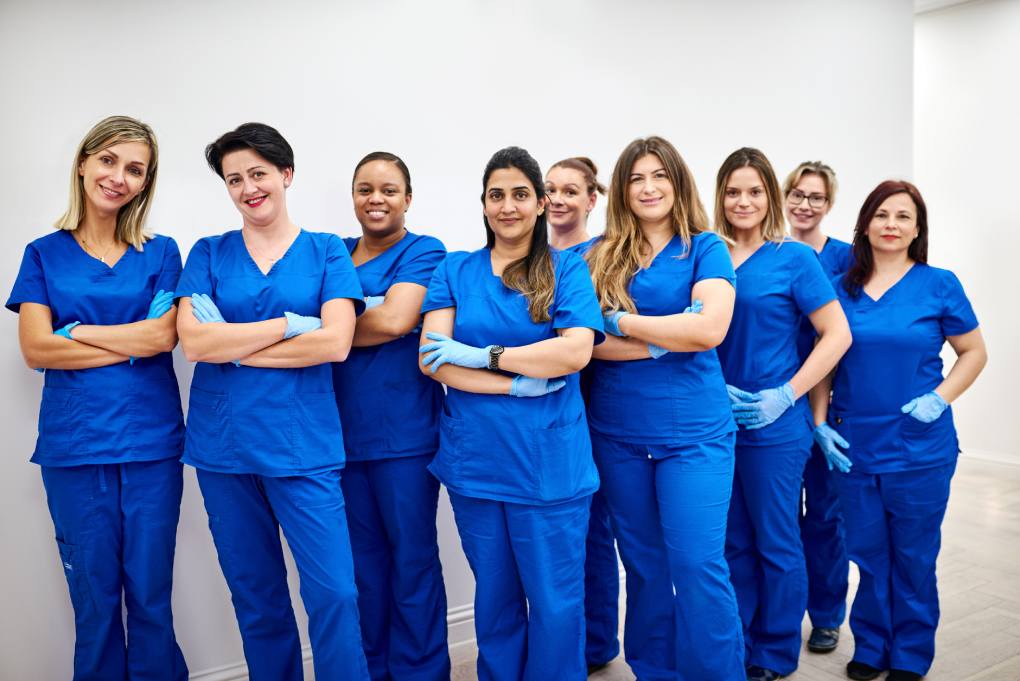Great opportunity: Hospitals Sponsoring Foreign Nurses After Passing the NCLEX in the US 2025

Hospitals Sponsoring Foreign Nurses After Passing the NCLEX in the US 2025
For many internationally educated nurses, one of the biggest questions after successfully passing the NCLEX is: Which hospitals in the United States actually sponsor foreign nurses?

The good news is that several U.S. healthcare systems actively provide sponsorship opportunities to qualified international nurses, covering visa processing and sometimes even relocation support. In fact, passing the NCLEX opens the door to direct hospital sponsorship programs, where employers are eager to fill critical nursing shortages by welcoming skilled foreign professionals into their teams. Understanding how this process works—and which hospitals are most likely to offer sponsorship—can help foreign nurses transition from exam success to securing a stable, rewarding career in the U.S.
The demand for registered nurses in America continues to grow, driven by an aging population, expanding healthcare needs, and ongoing staff shortages. Many hospitals, especially in underserved areas, struggle to maintain adequate staffing and turn to international recruitment as a sustainable solution. For foreign nurses, this creates a valuable pathway: after passing the NCLEX, hospitals sponsoring foreign nurses in the U.S. can provide the legal, professional, and financial support needed to begin working in the country. From direct employment sponsorships to third-party staffing agencies that partner with hospitals, opportunities exist across multiple states and healthcare settings.
However, securing hospital sponsorship is not automatic. Nurses need to understand the eligibility requirements, types of visas available—most commonly the EB-3 employment-based green card or the H-1B visa—and the practical steps for connecting with hospitals that hire internationally. It is also important to know which facilities have a history of sponsoring foreign nurses, since not all hospitals participate in these programs. By exploring sponsorship pathways, preparing strong applications, and leveraging professional recruitment networks, internationally educated nurses can successfully move from passing the NCLEX to practicing as registered nurses in U.S. hospitals.
This article will walk you through everything you need to know about hospitals sponsoring foreign nurses after passing the NCLEX in the U.S., including top sponsoring hospitals, visa options, requirements, and practical tips to start your nursing career in America.
Proven Guide: State Boards Accepting Foreign-Educated Nurses for the NCLEX 2025
Why U.S. Hospitals Sponsor Foreign Nurses After the NCLEX
The United States faces a persistent nursing shortage that continues to widen each year. According to workforce studies, thousands of registered nursing positions remain unfilled across hospitals, long-term care facilities, and community health centers. This shortage is most severe in rural hospitals, critical care units, and specialty areas such as geriatrics and emergency medicine.

To address this growing gap, U.S. hospitals have increasingly turned to internationally educated nurses who have proven their competence by passing the NCLEX-RN exam.
When a foreign nurse passes the NCLEX, it signals that they meet U.S. standards of nursing practice and are ready to deliver safe, high-quality care. Hospitals recognize the value of this achievement, which is why many are willing to sponsor qualified foreign nurses through visa sponsorship programs. Sponsorship not only allows healthcare institutions to fill vacant roles quickly but also helps ensure continuity of care for patients. For foreign nurses, this arrangement provides a direct pathway to employment in the U.S. and often includes additional benefits such as relocation assistance, orientation programs, and career development opportunities.
Sponsorship also benefits hospitals in the long term. Internationally trained nurses often bring diverse clinical experiences, cultural perspectives, and language skills that enrich patient care. In multicultural communities, this can be especially valuable, as patients may feel more comfortable when providers understand their background and communicate effectively. Furthermore, hiring foreign nurses through sponsorship programs helps hospitals stabilize staffing levels, reduce the costs of relying on temporary staff or travel nurses, and build a more sustainable workforce.
It is important to note that not every hospital in the U.S. offers sponsorship. Large healthcare systems, teaching hospitals, and facilities in high-demand areas are more likely to participate in these programs. Smaller community hospitals may also sponsor nurses, particularly if they face chronic shortages. For foreign nurses, researching which hospitals are open to international recruitment is a crucial step after passing the NCLEX.
In the following sections, we will explore the types of visas available, highlight some of the top U.S. hospitals known for sponsoring foreign nurses, and provide step-by-step guidance to help you secure a sponsored nursing position.
Types of Visa Sponsorships for Foreign Nurses in the U.S.
After passing the NCLEX, the next major step for foreign nurses seeking employment in the United States is obtaining the right visa. U.S. hospitals that sponsor international nurses typically provide assistance with the visa process, ensuring that qualified candidates can legally live and work in the country.

Understanding the different types of visa sponsorships available is essential for navigating this journey successfully.
1. EB-3 Employment-Based Green Card
The EB-3 visa is the most common pathway for foreign nurses entering the U.S. workforce. It is an immigrant visa that grants permanent residency, meaning nurses can live and work in the U.S. indefinitely. Many hospitals and healthcare systems prefer to sponsor nurses under this category because it offers long-term stability for both the nurse and the employer. Nurses applying for EB-3 sponsorship will need a job offer from a U.S. hospital, along with credentials verification through CGFNS or a similar body.
2. H-1B Temporary Work Visa
Some hospitals also sponsor foreign nurses through the H-1B visa, although this option is less common. The H-1B is a non-immigrant, temporary work visa typically valid for three years, with the possibility of extension. It is often used for nurses in highly specialized areas such as critical care, operating rooms, or advanced practice roles. While the H-1B route can be a faster entry into the U.S., it does not provide permanent residency, so many nurses eventually transition to an EB-3 sponsorship for long-term settlement.
3. TN Visa (for Canadian and Mexican Nurses)
Under the United States-Mexico-Canada Agreement (USMCA), Canadian and Mexican nurses can apply for a TN visa, which allows them to work in the U.S. more easily than other international applicants. Although this visa is renewable indefinitely, it does not lead directly to permanent residency. Still, it remains a highly accessible pathway for nurses from these countries.
4. Other Options
In rare cases, hospitals may sponsor foreign nurses through programs like the EB-2 visa for advanced-degree holders or through special arrangements for underserved areas. However, these are less common compared to the EB-3 and TN routes.
For foreign nurses, knowing which visa pathway fits best is key to planning a U.S. nursing career. Hospitals sponsoring foreign nurses after NCLEX often guide candidates through the process, but being informed helps nurses make better decisions about their future.
California NCLEX Requirements for Foreign Nurses in 2025 – Easy Guide
Top U.S. Hospitals Sponsoring Foreign Nurses After NCLEX
Once you have passed the NCLEX, the next step is finding a hospital that actively sponsors foreign nurses. Not all healthcare facilities offer sponsorship programs, but many large hospital systems and networks across the U.S. are well-known for hiring international nurses to fill critical staffing shortages. These hospitals typically assist with visa processing, relocation, and sometimes provide additional benefits like housing support and orientation programs. Below are some of the most recognized hospitals and healthcare systems that have a history of sponsoring foreign nurses.
1. Cleveland Clinic (Ohio and Nationwide Locations)
Cleveland Clinic is a world-renowned hospital system that regularly sponsors internationally educated nurses. With facilities in Ohio, Florida, and other states, the organization recruits foreign nurses to meet its growing staffing needs in specialty areas such as critical care, medical-surgical nursing, and cardiology.
2. Mayo Clinic (Minnesota, Arizona, Florida)
The Mayo Clinic is one of the top-ranked hospitals in the U.S. and is known for offering sponsorship opportunities to international nurses who meet their high standards. Nurses at Mayo Clinic benefit from comprehensive orientation programs and opportunities for career advancement, making it a strong choice for foreign nurses seeking long-term employment.
3. Johns Hopkins Hospital (Maryland)
As one of the leading teaching hospitals in the country, Johns Hopkins frequently sponsors foreign nurses to support its highly specialized departments, including oncology, pediatrics, and intensive care. The hospital provides a structured environment for professional growth, making it attractive to internationally trained nurses.
4. Houston Methodist Hospital (Texas)
Houston Methodist is part of a large hospital system in Texas that recruits and sponsors foreign nurses. With Texas experiencing a growing nursing shortage, hospitals like Houston Methodist rely on international talent to maintain quality patient care across their facilities.
5. Mount Sinai Health System (New York)
Located in New York City, Mount Sinai Health System is another major employer that has historically sponsored foreign nurses. Its large network of hospitals and specialty centers offers a wide range of opportunities for internationally educated nurses in various fields of practice.
6. AdventHealth (Florida and Multiple States)
AdventHealth is a faith-based hospital system with facilities across the U.S., particularly in Florida. The organization actively recruits international nurses, often offering relocation assistance and integration programs to help them adapt to the U.S. healthcare system.
7. Community and Rural Hospitals
In addition to large teaching hospitals, many smaller community and rural hospitals also sponsor foreign nurses, especially in areas where local recruitment is difficult. These hospitals may offer unique opportunities for nurses willing to work outside major metropolitan areas.
By targeting hospitals and healthcare systems known for international sponsorship, foreign nurses can significantly increase their chances of securing employment after passing the NCLEX. Partnering with recruitment agencies that collaborate with these hospitals can also streamline the process.
Eligibility & Requirements for Hospital Sponsorship
Passing the NCLEX is a major milestone, but it is not the only requirement for securing sponsorship from a U.S. hospital. Internationally educated nurses must meet specific criteria to ensure they are eligible to work legally in the United States and provide safe, high-quality care.

Understanding these requirements ahead of time can help you prepare a strong application and improve your chances of being sponsored.
1. Valid NCLEX-RN Pass
The most essential requirement is proof of passing the NCLEX-RN exam. Hospitals will not consider sponsorship applications unless the candidate has demonstrated competence by meeting U.S. nursing standards through this exam.
2. English Language Proficiency
Most foreign nurses must show English language proficiency through standardized tests such as IELTS or TOEFL, unless they were educated in an English-speaking country. This ensures that nurses can communicate effectively with patients, families, and healthcare teams.
3. Credentials Evaluation (CGFNS or Equivalent)
Hospitals require verification of international nursing credentials. Organizations such as the Commission on Graduates of Foreign Nursing Schools (CGFNS) review transcripts, licenses, and training to confirm they meet U.S. requirements. A VisaScreen® certificate from CGFNS is often necessary for visa processing.
4. Valid Nursing License
In addition to passing the NCLEX, nurses must hold a valid state nursing license in the U.S. The licensing process varies by state, so applicants should check the requirements of the state where they intend to work.
5. Immigration Eligibility
Hospitals will only sponsor nurses who meet U.S. immigration requirements for employment visas such as EB-3, H-1B, or TN (for Canadian and Mexican nurses). Having a clean legal record and no disqualifying immigration history is critical for approval.
6. Clinical Experience
While not always mandatory, many hospitals prefer foreign nurses with at least one to two years of clinical experience in areas like medical-surgical, critical care, or specialized nursing. Experience strengthens your application and makes you a more competitive candidate.
7. Commitment to Work Contract
Hospitals that sponsor international nurses often require a work contract ranging from two to three years. This agreement ensures that the hospital’s investment in visa sponsorship and relocation is matched by a nurse’s commitment to stay and provide care.
Meeting these eligibility criteria shows hospitals that you are ready for sponsorship and capable of integrating into the U.S. healthcare system. Preparing the required documents early, especially the VisaScreen® certificate and state licensure, can help speed up the sponsorship process.
Easy Steps: NCLEX Requirements for Foreign Nurses in the US (2025 Guide)
Step-by-Step Guide to Securing a Sponsored Nursing Job in the U.S.
For foreign nurses who have successfully passed the NCLEX, the journey to securing a sponsored job in a U.S. hospital involves several well-defined steps. Following a clear process not only increases your chances of sponsorship but also helps you avoid delays and missed opportunities.

Below is a practical step-by-step guide to landing a sponsored nursing position in the United States.
Step 1: Obtain NCLEX-RN Results and State Licensure
Start by ensuring your NCLEX-RN pass results are officially documented and that you are licensed in at least one U.S. state. Many hospitals will only consider candidates who hold a valid state license, so complete this step before applying for jobs.
Step 2: Secure a VisaScreen® Certificate
Apply for a VisaScreen® certificate through CGFNS or an equivalent body. This certificate verifies your credentials, English proficiency, and nursing education, making you eligible for a U.S. work visa. It is a mandatory requirement for foreign nurses applying for sponsorship.
Step 3: Research Hospitals and Healthcare Systems that Sponsor Nurses
Target hospitals with a history of sponsoring international nurses. Large healthcare systems like Cleveland Clinic, Mayo Clinic, and AdventHealth are good starting points. Smaller community hospitals may also provide sponsorship if they face staffing shortages.
Step 4: Apply Directly or Through Recruitment Agencies
Foreign nurses can apply directly to hospitals or work with international recruitment agencies that partner with U.S. hospitals. Agencies often streamline the process by matching you with employers who are actively hiring and sponsoring.
Step 5: Prepare a Strong Application Package
Your application should include a professional CV, NCLEX results, proof of licensure, VisaScreen® certificate, and references from previous employers. Highlight clinical experience, language skills, and adaptability, as U.S. hospitals value nurses who can integrate smoothly into their teams.
Step 6: Attend Interviews (Virtual or In-Person)
Many hospitals conduct online interviews for international nurses. Be prepared to discuss your clinical experience, areas of expertise, and willingness to commit to a multi-year contract. Clear communication and professionalism are key during this stage.
Step 7: Receive Sponsorship Offer and Begin Visa Process
If selected, the hospital will issue a sponsorship offer, typically tied to an EB-3 visa. Work closely with the hospital’s HR team or an immigration lawyer to ensure all documents are submitted correctly and on time.
Step 8: Relocate and Complete Orientation
Once your visa is approved, the hospital may provide relocation support, housing assistance, and orientation programs to help you adjust. Orientation usually includes familiarization with U.S. healthcare practices, hospital policies, and cultural adaptation support.
By following these steps diligently, foreign nurses can move from passing the NCLEX to securing stable employment in the U.S. through hospital sponsorship. Patience and preparation are key, as the process can take several months to a year depending on visa timelines.
Benefits of Hospital Sponsorship for Foreign Nurses
Securing hospital sponsorship after passing the NCLEX is more than just a way to enter the U.S. workforce—it’s a pathway that offers stability, growth, and long-term opportunities. Sponsorship programs are designed not only to fill staffing gaps for hospitals but also to help internationally educated nurses integrate smoothly into the American healthcare system. Below are the key benefits foreign nurses can expect from hospital sponsorship.
1. Legal Work Authorization and Job Security
The most obvious benefit of sponsorship is legal permission to work in the U.S. With an EB-3 green card or other visa, nurses gain the ability to live and practice in America without fear of immigration complications. This creates a stable foundation for building a long-term career.
2. Financial Support for Relocation
Many hospitals cover significant costs involved in the sponsorship process, including visa fees, licensing expenses, flights, and sometimes even temporary housing. This financial assistance greatly reduces the burden for nurses relocating from abroad.
3. Professional Development and Training
Hospitals sponsoring foreign nurses often provide structured orientation and training programs. These may include mentorship, cultural adaptation sessions, and continuous education opportunities, allowing nurses to adapt more effectively to U.S. healthcare practices.
4. Pathway to Permanent Residency
For nurses on EB-3 sponsorship, hospital support leads directly to a green card and permanent residency. This is one of the strongest advantages of hospital sponsorship, as it opens doors to long-term stability and eventually U.S. citizenship if desired.
5. Career Advancement Opportunities
Foreign nurses are not limited to bedside roles. Many hospitals that sponsor international nurses encourage growth into leadership, education, or specialty practice areas. With experience, nurses may pursue advanced practice roles or management positions within the same hospital system.
6. Cultural Exchange and Global Networking
Working in the U.S. healthcare system exposes foreign nurses to advanced technology, diverse patient populations, and global best practices. At the same time, they bring unique cultural and clinical perspectives that enrich the hospital environment.
7. Family Sponsorship Benefits
Many visa sponsorships extend benefits to immediate family members, allowing nurses to bring spouses and children to the U.S. This creates a pathway not just for professional growth but for family settlement as well.
For internationally educated nurses, hospital sponsorship is more than just a job offer—it is a comprehensive support system that helps them transition successfully into a new country while building a rewarding nursing career.
Challenges of Hospital Sponsorship and How to Overcome Them
While hospital sponsorship offers incredible opportunities for foreign nurses after passing the NCLEX, the process is not without obstacles. From long visa wait times to cultural adjustments, nurses must be prepared to face challenges along the way. The good news is that with the right mindset and preparation, most of these hurdles can be successfully managed.
1. Lengthy Visa Processing Times
One of the biggest frustrations for foreign nurses is the waiting period for visa approvals, especially under the EB-3 program. Delays can range from several months to over a year, depending on visa quotas and country of origin.
Solution: Begin the VisaScreen® process early, keep documents updated, and stay in regular contact with your hospital’s HR team or immigration lawyer to avoid unnecessary delays.
2. High Competition for Sponsorship
Not every hospital sponsors foreign nurses, and those that do often receive applications from thousands of candidates worldwide. This makes the process competitive.
Solution: Build a strong application by highlighting your clinical experience, specialized skills, and adaptability. Applying through reputable recruitment agencies can also give you access to exclusive sponsorship opportunities.
3. Adapting to U.S. Healthcare Culture
Foreign nurses may struggle initially with differences in technology, documentation requirements, patient expectations, and workplace culture in U.S. hospitals.
Solution: Take advantage of hospital orientation programs, seek mentorship from experienced colleagues, and participate in continuing education to bridge practice gaps.
4. Contractual Obligations
Most sponsorships require a 2–3 year work contract. Breaking a contract early may result in penalties, repayment of expenses, or visa complications.
Solution: Carefully review contracts before signing and make sure you are comfortable with the location, hospital policies, and work conditions before committing.
5. Emotional and Social Adjustments
Relocating to a new country can be overwhelming. Nurses often face homesickness, cultural isolation, and the stress of adjusting to a new environment.
Solution: Build a support system by connecting with other international nurses, joining professional associations, and maintaining regular communication with family back home.
6. Licensing and State Variations
Each U.S. state has its own nursing board with specific licensing requirements. Even after passing the NCLEX, additional paperwork may be required to practice in certain states.
Solution: Research state-specific requirements early and choose states with hospitals that actively sponsor foreign nurses to avoid unnecessary complications.
Despite these challenges, thousands of internationally educated nurses successfully transition to rewarding careers in the U.S. every year. With patience, preparation, and resilience, the journey from NCLEX success to hospital sponsorship can lead to a stable and fulfilling professional future.
Conclusion: Building Your U.S. Nursing Career Through Hospital Sponsorship
For internationally educated nurses, passing the NCLEX is only the beginning of an exciting career journey in the United States. The next crucial step is finding hospitals that sponsor foreign nurses—a process that opens the door to stable employment, professional growth, and long-term residency options. Sponsorship programs are not just about filling staffing gaps; they are structured pathways that help international nurses integrate into the U.S. healthcare system while contributing their valuable skills to communities in need.
From world-class institutions like Cleveland Clinic and Mayo Clinic to community hospitals in underserved areas, opportunities exist across the country for qualified foreign nurses. While challenges such as visa delays, cultural adaptation, and contract obligations may arise, these hurdles are manageable with the right preparation, guidance, and support. Hospitals that sponsor international nurses often provide not only work authorization but also relocation assistance, training, and mentorship, making the transition smoother for those committed to the process.
The benefits are significant: legal work authorization, permanent residency through EB-3 sponsorship, financial support for relocation, and opportunities for career advancement. For many nurses, hospital sponsorship also extends life-changing benefits to their families, allowing them to build a secure and fulfilling life in the U.S.
If you are a foreign nurse who has recently passed the NCLEX, now is the time to take proactive steps—research sponsoring hospitals, prepare your credentials, and apply strategically. Whether through direct applications or reputable recruitment agencies, your pathway to becoming a U.S. registered nurse is within reach.
With determination, patience, and the right guidance, you can turn your NCLEX success into a rewarding nursing career in the United States. Hospital sponsorship is not just an employment option—it’s a bridge to new opportunities, professional stability, and a brighter future for you and your family.
Data & Policy Insights
-
Kaiser Family Foundation (KFF) – The Growing Role of Foreign-Educated Nurses in U.S. Hospitals and Implications of Visa Restrictions:
In 2022, 32% of U.S. hospitals (accounting for 45% of beds) reported hiring foreign-educated RNs—double the rate from 2010.
KFF
URL: https://www.kff.org/racial-equity-and-health-policy/the-growing-role-of-foreign-educated-nurses-in-u-s-hospitals-and-implications-of-visa-restrictions/ -
Becker’s Hospital Review – “32% of US hospitals hired international nurses in 2022: KFF”:
Highlights the same KFF data and notes around 500,000 immigrant nurses working in U.S. healthcare — about one in six RNs.
http://Becker’s Hospital Review
URL: https://www.beckershospitalreview.com/quality/nursing/32-of-us-hospitals-hired-international-nurses-in-2022-kff/
Sponsorship Programs in Action
-
Fresenius Medical Care – International Registered Nurse Visa Sponsorship Program:
Offers visa and immigration support for nurses and their families, relocation, licensing support, and career advancement opportunities.
http://jobs.freseniusmedicalcare.com
URL: https://jobs.freseniusmedicalcare.com/international-registered-nurse-visa-sponsorship/job/79C3B52234A812B9FA7BF5BA4CF90AEE
Credentialing and Evaluations
-
TruMerit (formerly CGFNS) – Non-profit credential evaluation organization for foreign-educated nurses. Known for processing VisaScreen® certificates necessary for U.S. licensure and visa sponsorship.
http://Wikipedia
URL: https://www.cgfns.org/
FAQs: Hospitals Sponsoring Foreign Nurses After NCLEX
Yes, many hospitals sponsor qualified nurses after NCLEX, especially in shortage areas.
The EB-3 green card is the most common and provides permanent residency.
Typically 6 months to 1 year, depending on visa processing and quotas.
No, but many large systems and rural hospitals do.
NCLEX results, state license, VisaScreen®, transcripts, English test results, and professional references.





2 Comments